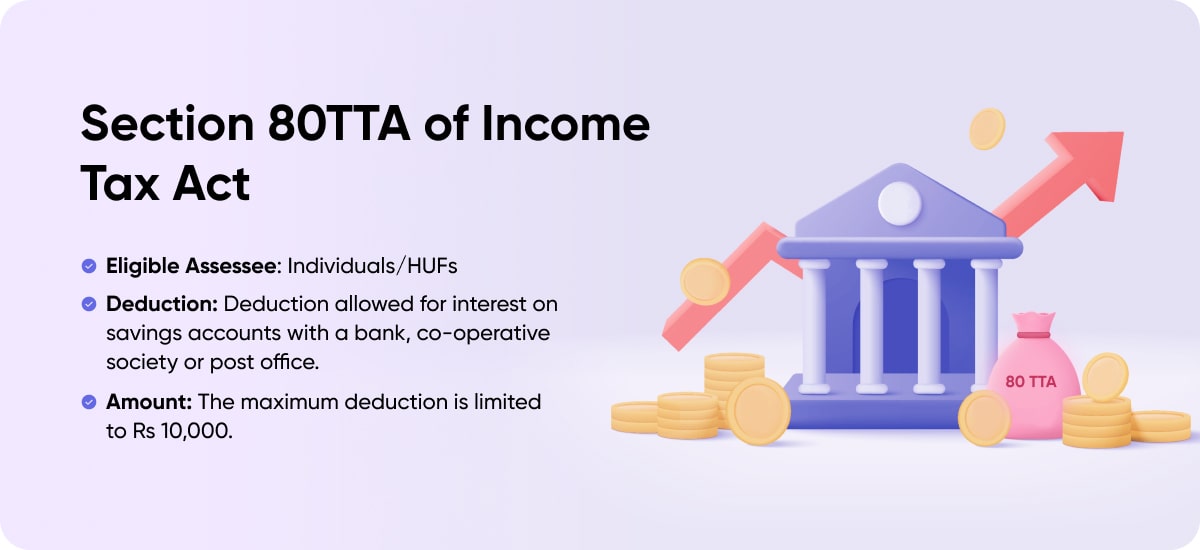Section 80TTA of Income Tax Act – All about Claiming Deduction on Interest
Your savings bank interest is taxable!
Ever wondered how savings bank interest is taxed and if you could save the income tax on it?
We all have a savings bank account but most of us are not aware that the interest received is taxable under the head ‘Income from other sources'. However, you can save taxes on interest received up to Rs 10,000. Section 80TTA of the Income Tax Act, 1961 provides a deduction of Rs 10,000 on such interest income. This article delves deeper into the details of Section 80TTA.

What is Section 80TTA?
Section 80TTA of the Income Tax Act, 1961 provides a deduction of up to Rs 10,000 on the income earned from interest on savings made in a bank, co-operative society or post office. There is no deduction for interest earned from fixed deposits an recurring deposits.
Who can Claim 80TTA Deduction? Can NRIs Avail of a Deduction under 80TTA?
Section 80TTA deduction is available to an Individual and HUF.
Yes, NRIs can also avail a deduction under Section 80TTA. It is pertinent to note that NRIs are allowed to open only two types of accounts in India. i.e. NRE and NRO accounts. However, only the NRO savings account holders can claim the benefit of Section 80TTA as interest earned on NRE accounts are tax-free.
Note:
- This section is not applicable to senior citizens aged 60 years or more as Section 80TTB applies to them.
- 80TTA and 80TTB are mutually exclusive. If both the sections are applicable to the assessee, he can choose only one deduction which is most beneficial to him.
Which Type of Interest Incomes are Allowed as Deduction Under Section 80TTA
You can claim a deduction for interest income earned from the following:
- From a savings account with a bank
- From a savings account with a co-operative society carrying on the business of banking
- From a savings account with a post office
Interest Income Not Allowed as Deduction Under Section 80TTA
The deduction under Section 80TTA shall not be allowed for –
- Interest from fixed deposits
- Interest from recurring deposits
- Interest earned on corporate bonds and debentures.
- Interest from Provident fund deposits
- Interest from lending business
Maximum Deduction Allowed Under Section 80TTA
The maximum deduction is limited to Rs 10,000. If your interest income is less than Rs 10,000, the entire interest income will be your deduction. If your interest income is more than Rs 10,000, your deduction shall be limited to Rs 10,000. (You have to consider your total interest income from all banks in case you have multiple accounts).
How to Claim Deduction Under Section 80TTA
First, add your total interest income under the head ‘Income from Other Sources’ in your return. Calculate your gross total income for the financial year from all the income heads and then show it as a deduction under Section 80TTA.(Chapter Vi-A deductions)
Important: You can claim Section 80TTA deduction only if you opt for the old regime as new regime is default from now.
For Example:
If Mr A (aged 35 years) earns a salary income of Rs 5,00,000, interest on savings account with a bank is Rs 5,000 and on fixed deposits is Rs 15,000 in a financial year. Also, an eligible amount for deduction of Rs 10,000 under Section 80C. Then, taxable income will be computed under the old tax regime as below:-
| Particulars | Amount (in Rs) | Amount (in Rs) |
| Income from Salary Less: Standard Deduction | 5,00,000 (50,000) | 4,50,000 |
| Income from other sources -Interest on savings account -Interest on fixed deposits | 5,000 15,000 | 20,000 |
| Gross Total Income | 4,70,000 | |
| Less: Chapter VI-A deduction -80C -80TTA | 10,000 5,000 | (15,000) |
| Taxable Salary | 4,55,000 |
Note:
- Deduction u/s 80TTB cannot be claimed if the assessee is not a senior citizen.
